Zdravka Mihaylova, for GRReporter exclusive
Rhea Galanaki was born in Heraklion, Crete in 1947. She studied history and archaeology in Athens, and is the author of novels, short stories, poems and essays, and a founding member of the Society of Greek Writers (1981). She won the State Award twice (in 1999, for her novel "Eleni, or Nobody" and in 2005, for her collection of short stories "An Almost Blue Hand"). She was also awarded the prize for 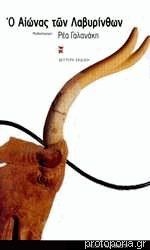 prose of the Kostas and Eleni Ourani Foundation - Academy of Athens (in 2003, for her novel "The Age of Labyrinths"), the "Nikos Kazantzakis" prize of the Municipality of Heraklion, Crete (1987) and the prize of readers of the National Book Centre in 2006 for her fictional chronicle "Silent, Deep Waters." Her novel "The Life of Ismail Ferik Pasha" is the first Greek book included in UNESCO’s Collection of Representative Works (1994) and "Eleni, or Nobody" was on the final list of the three books contending for the European Prize "Aristion" (1999). Her works have been translated into fifteen languages including Bulgarian. She had worked with director Theo Angelopoulos on the script of his last and unfinished film "The Other Sea".
prose of the Kostas and Eleni Ourani Foundation - Academy of Athens (in 2003, for her novel "The Age of Labyrinths"), the "Nikos Kazantzakis" prize of the Municipality of Heraklion, Crete (1987) and the prize of readers of the National Book Centre in 2006 for her fictional chronicle "Silent, Deep Waters." Her novel "The Life of Ismail Ferik Pasha" is the first Greek book included in UNESCO’s Collection of Representative Works (1994) and "Eleni, or Nobody" was on the final list of the three books contending for the European Prize "Aristion" (1999). Her works have been translated into fifteen languages including Bulgarian. She had worked with director Theo Angelopoulos on the script of his last and unfinished film "The Other Sea".
- Your novel "The Life of Ismail Ferik Pasha" (Bulgarian edition of Lada publishing house, Sofia, 1998) marks the beginning of a series of creative experiments addressing the issue of the ambivalent, dual identity regarding the relationship between the province and the centre, the East and the West, the male and the female, between Christians and Muslims... The motif of the people torn between two communities or two religions is clearly seen in "The Story of Olga" ("Homocentric Stories", Agra Publications, 1985; the collection of short stories was reprinted by Kastaniotis in 2004, under the title "An Almost Blue Hand"). How is this topic, in which you are deeply involved apparently, changing and evolving in your subsequent works?
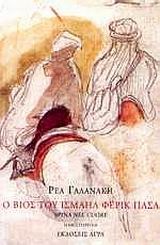 - Everything that you are saying is true. The duality of some of my characters is apparent and another dominant motif in my work, namely that of return (νόστος), often fits in this fundamental duality. I do not know whether its development is linear or if it follows a circle; in any case, it is subject to a literary differentiation in my separate books because, in each of my novels, the architectonics and the style change in accordance with the theme, characters, or other signs. Each theme entails its own literary device but the stamp of the author is always easily distinguishable. I would add, as it is a long-known fact, that human drama is caused by the clash between two situations, as in classical tragedy in which it is caused by the conflict between two principles, namely the divine and human origin. I have not added new things; I have just taken the risk of raising issues, equally modern and unanswered, or with different interpretations over time, in a specific historical context, after a long absence of the historical present in modern Greek prose. I started from historical present to go so far as to explore those and other issues, even in modern societies. As usual, I lean on a deep, poignant emotion provoked in me by a person, an event, suppression or perhaps grievance, to build my own original stage set around them.
- Everything that you are saying is true. The duality of some of my characters is apparent and another dominant motif in my work, namely that of return (νόστος), often fits in this fundamental duality. I do not know whether its development is linear or if it follows a circle; in any case, it is subject to a literary differentiation in my separate books because, in each of my novels, the architectonics and the style change in accordance with the theme, characters, or other signs. Each theme entails its own literary device but the stamp of the author is always easily distinguishable. I would add, as it is a long-known fact, that human drama is caused by the clash between two situations, as in classical tragedy in which it is caused by the conflict between two principles, namely the divine and human origin. I have not added new things; I have just taken the risk of raising issues, equally modern and unanswered, or with different interpretations over time, in a specific historical context, after a long absence of the historical present in modern Greek prose. I started from historical present to go so far as to explore those and other issues, even in modern societies. As usual, I lean on a deep, poignant emotion provoked in me by a person, an event, suppression or perhaps grievance, to build my own original stage set around them.
- In one of your interviews you said, "Too early I have become the victim of a fairy tale." Is your native island of Crete, with its abundance of so many myths and legends, to blame for this?
- Every child can become a "victim of a fairy tale" just like every adult can become a "victim of love". It is the same thing. I do not believe there is a special connection with Crete, although the myths of neighbouring Knossos (I was born and raised in Heraklion) are indelibly carved on the hard drive of my childhood memory, as evidenced by some of my writings. My decision to study archaeology and history is largely the result of the charm of the myths and legends, but also of the stories about the misadventures of my family in times of peace and war which I heard at the family table.
- In the novel "Fires of Judas, Ashes of Oedipus" (Kastaniotis, 2009), the arrival, in the year 2000, of a young Greek woman of Jewish descent in a Cretan village in order for her to become a teacher there as well as the Easter custom of burning the effigy of Judas, offer you the opportunity of dissecting the "inaccessible" modern closed mountain communities on the island. Conflicts and contradictions between law and lawlessness, love and rituality, murder and suppression abound. How does the ancient Cretan tradition attribute the fate of the mythical Oedipus to the biblical Judas and why?
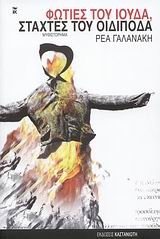 - In this latest novel, I have combined two things. On the one hand, the knowledge that in a poem of Cretan literature of the 15th century (published a few years ago), Judas bears the burden not only of his own "sins" but also those of Oedipus, i.e. the unconscious parricide of Lai and the incest with his mother Jocasta. Oral versions of the poem were preserved in Crete until the 20th century. So Judas, and all Jews later, embodied the absolute evil, not only in Crete in that era but also in a wider area, as this myth is particularly widespread in the Mediterranean. This was a new type of anti-Semitism and racism, both of which have already been recognized in Greece since the beginning of the 21st century, prior to their current expansion. As for the "Fires of Judas", they refer to a custom existing in many Greek villages, namely to burn the effigy of Judas, during a festive celebration every year at Easter, in order to symbolically punish the Jew.
- In this latest novel, I have combined two things. On the one hand, the knowledge that in a poem of Cretan literature of the 15th century (published a few years ago), Judas bears the burden not only of his own "sins" but also those of Oedipus, i.e. the unconscious parricide of Lai and the incest with his mother Jocasta. Oral versions of the poem were preserved in Crete until the 20th century. So Judas, and all Jews later, embodied the absolute evil, not only in Crete in that era but also in a wider area, as this myth is particularly widespread in the Mediterranean. This was a new type of anti-Semitism and racism, both of which have already been recognized in Greece since the beginning of the 21st century, prior to their current expansion. As for the "Fires of Judas", they refer to a custom existing in many Greek villages, namely to burn the effigy of Judas, during a festive celebration every year at Easter, in order to symbolically punish the Jew.
So, I created a novel in which I combined the aforementioned myth, in a sociogram, with modern Crete, especially with the "impenetrable sanctum" of some of its mountain villages where totally illegal and very profitable ventures had been thriving. When their existence was revealed, there was a fuss but the monolithic view of the mass media as regards these villages did not satisfy me and it does not completely coincide with mine. I was aware of the multiple layers which are inherent in such communities. That is why I have preferred their internal conflicts, the different roles of men and women and their sudden changing; I have preferred what works subversively but crucially below the surface. My interest was attracted by a brief note that "no teacher could stay in those communities for more than a year." So, I have portrayed the image of the young Greek teacher of Jewish origin, i.e. , "twice" a foreigner," whose arrival in such an "inaccessible" mountain community stirs up some local stories suppressed from the time of the German occupation, revives the customs of punishment and revenge, gives rise to love and death, continues the clash of written and unwritten law.
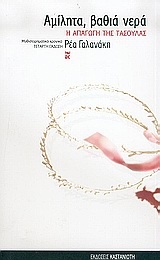 However, this novel would have never been written without my book, "Silent, Deep Waters" (2006), which immediately precedes it and in which I explore in depth and recreate, in the form of a fictional chronicle, a historical and well-known case of kidnapping that happened in Crete in 1950. Both books should be read in parallel. The mirror between them is fifty years, which separate the events. The reflections from the closed mountain communities appear crystal clear in their similarities and differences, the clash between written and unwritten law continues to flourish, dividing the people, time passes, remaining still as the high mountains.
However, this novel would have never been written without my book, "Silent, Deep Waters" (2006), which immediately precedes it and in which I explore in depth and recreate, in the form of a fictional chronicle, a historical and well-known case of kidnapping that happened in Crete in 1950. Both books should be read in parallel. The mirror between them is fifty years, which separate the events. The reflections from the closed mountain communities appear crystal clear in their similarities and differences, the clash between written and unwritten law continues to flourish, dividing the people, time passes, remaining still as the high mountains.
- The collection (containing your articles published in the period 1992-2011) entitled "From Life to Literature" (Kastaniotis, 2011) is a book, a mosaic, of pieces of life, confession flashbacks in time, it is about people and places and contains thoughts about literature, history and modern "female speech". Does this book act as a fragmentary autobiography?
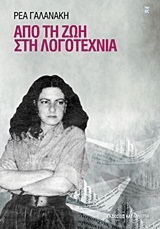 - It could be seen as "pieces of autobiography." The book includes articles related to certain people who have played a major role in my life, articles written because, for some reason, I was commissioned by various media to say something about these beautiful deceased persons. In other words, I myself did not sit down to remember and share my life, I just wrote a little about myself while talking about others. An autobiography would not be written in such a way.
- It could be seen as "pieces of autobiography." The book includes articles related to certain people who have played a major role in my life, articles written because, for some reason, I was commissioned by various media to say something about these beautiful deceased persons. In other words, I myself did not sit down to remember and share my life, I just wrote a little about myself while talking about others. An autobiography would not be written in such a way.
We should consider as "autobiographical" the other articles in the book relating to literary issues such as the role of the birthplace in my writing, the way I have developed the History - Literature relationship, "the mastery of the texts," the modern "female writing", etc. Some of them had been commissioned and others not. I perceive them as "autobiographical" too because the life of every one of us is not just a series of events and fateful meetings, but also of ideas, enlightenment, concerns and questions preying on our minds, of reconsidering opinions and behaviours. Nor does literature consist only of events; they are directed by the ideas, attitudes and clashes within the specific age.
- During the municipal elections in 2010, you were elected in the new municipal leadership of Athens, in the list of Mayor George Kaminis. Your election in the front lines of the municipality means that your books alone influence a wider audience. You are the deputy chairman of the management board of the municipal radio station "Athens 9.84". How do you combine the role of a literary artist with that of a municipal employee? Do you have time to write?
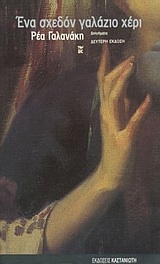 - My election really surprised me because I had refused to carry out any election campaign in support of my application, and because I have lived in Patras over the past thirty years. I just wanted to help in one direction as I was persistently invited to do so. Is the election due to my books? It is a stake won by all books, by all readers, not only by me.
- My election really surprised me because I had refused to carry out any election campaign in support of my application, and because I have lived in Patras over the past thirty years. I just wanted to help in one direction as I was persistently invited to do so. Is the election due to my books? It is a stake won by all books, by all readers, not only by me.
I have arrived at a lot of conclusions. The most important one, with all the risk of my personal opinion, is that, especially today, arts and active political activity cannot walk the same path. They have different directions, require a different mind-set; the ethic of each is different as well. The crisis has polarized their differences, precisely because it is not just economic. No crisis has ever been just one or the other, whereas all crises have been used as a pretext for institutional violence of any kind.
In any case, the lack of funds has brought the arts down on their knees, especially with regard to the making, distribution and marketing of books, but also as concerns all cultural products dependent on government subsidies. Writers are stunned but have never stopped writing, good books are still being published, albeit less, but they are rarely following the path they followed until recently. However, there are other phenomena. For example, theatre and music are flourishing in the Athens of the crisis, as small groups are finding alternative spaces where they are performing, thus receiving an immediate revenue, without a chain of intermediaries, as is the case with books, for example. Festivals survive on tight budgets but with a worthy programme. Ticket prices are low, there are numerous discounts, and the people support arts as they can. In other words, the lack of money may have brought some aspects of arts down on their knees, but it has not destroyed them because no crisis has ever destroyed the arts.
Since no crisis has ever destroyed arts, I repeat this. This is why the arts are resisting today, especially artists, precisely because they are supplying themselves with new subjects, I would say, they are "suckling" from the other aspects of the crisis, namely its immoral side, the intolerable lawlessness, the state authoritarianism, the mechanisms of corruption, the human degradation, anger, poverty, hunger, suicide; from the incompetence of the government to stop this deadly move, perhaps because they are not directly affected - just like many others, who are defiantly visible among us, are not affected either. Arts, as I understand them, cannot lean on anything but human drama, whatever the mask of time or faces it uses, whatever form it takes or whatever theory it relies on. A lot of tragedies are happening around us, "a street novel is being written every day," as I say elsewhere.
- Your poems are included in the anthology "Daughters of Sappho: Contemporary Greek women poets," ([Tr.by]: Rae Dalven · Editor Rae Dalven. Rutherford: Fairleigh Dickinson University Press, 1994), among works of Greek women poets like M. Poliduri, Zoe Kareli, Rita Boumi - Pappa, Eleni Vakalo, Victoria Theodorou, Lydia Stephanou, Kiki Dimoula, Nana Isaiah, Zefi Daraki, Katerina Anghelaki Rooke, Pavlina Pampoudi, Jenny Mastoraki, Veroniki Dalakoura etc. How did the Anglo-Saxon readership respond to this edition?
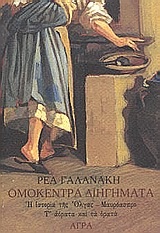 - I have no idea of the fate of the anthology. However, I am surprised that you are asking me about it when my other novels have been translated into fifteen languages. I have no clear idea of them either although I have a direct interest in them. At first, I was informed but not about all translations, since when things have faded away, especially in recent years, when the Greeks have been perceived as second-class citizens and no one "wants to play with us," and the crisis has affected many countries. The translation of foreign authors into Greek has somewhat declined as well. As far as I know, the works of no contemporary Greek author other than the good crime novels by Petros Markaris have a lasting and active presence abroad.
- I have no idea of the fate of the anthology. However, I am surprised that you are asking me about it when my other novels have been translated into fifteen languages. I have no clear idea of them either although I have a direct interest in them. At first, I was informed but not about all translations, since when things have faded away, especially in recent years, when the Greeks have been perceived as second-class citizens and no one "wants to play with us," and the crisis has affected many countries. The translation of foreign authors into Greek has somewhat declined as well. As far as I know, the works of no contemporary Greek author other than the good crime novels by Petros Markaris have a lasting and active presence abroad.
I would, however, like to add the following: this does not matter. We write in Greek, we write about what we experience, but also about what rules our imaginations, our literature accurately measures our relative weight. The rest is either coming or not. So it does not matter.
In 2011 the Benaki Museum, at 138 Pireos Street, presented a major exhibition of marine artist Jean Altamouras (Italy, 1852 – Spetses, 1878), the son of the first Greek female painter of the 19th century, Eleni Boukoura – Altamouras, who broke many of the stereotypes and conventions of her time. In parallel with this exhibition, the National Film Archive screened a documentary (directed by Kleoni Flessa) on the life of Eleni Altamouras. She is the daughter of Ioannis Boukouras, a hero of the Greek Liberation Revolution of 1821, a ship-owner from the Island of Spetses, who had provided part of his wealth for the national struggle. Eleni studied painting in Rome and Florence while living in Italy with her husband, Italian painter Saverio Altamouras, and took part in the revolutionary uprising for the unification of Italy. Is this cinema biography shedding enough light on the creative, poetic and revolutionary way in which this woman and pioneer artist lived her life? What is the aspect from which you have recreated Eleni Altamouras’ life in your novel "Eleni, or Nobody?" Is this title a reference to the answer given by Odysseus to the Cyclops when he asks, "Who are you?" and the clever hero of Ithaca replies "Nobody" ("Ούτις")?
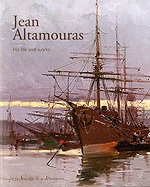 - My novel preceded the film. They differ as you have found out and this is natural. The difference can be seen from the title which actually refers to "Ούτις", to "Nobody", Odysseus’ reply to the Cyclops. That is, differences can be established at the multiple levels which that novel contains.
- My novel preceded the film. They differ as you have found out and this is natural. The difference can be seen from the title which actually refers to "Ούτις", to "Nobody", Odysseus’ reply to the Cyclops. That is, differences can be established at the multiple levels which that novel contains.
I tried to see the life of Eleni Altamouras as the Odyssey of a woman, so I divided the text into 24 parts (Homer's "Odyssey" contains 24 songs - Z.M.’s note). This "Nobody", in the first place, is the response to the Odyssey of a woman, and secondly, to the oblivion that has covered the paintings of Eleni Altamoura, who is still almost embracing feminine creativity, and thirdly, to the fact that the female artist lived disguised as a man for two years in order to study painting in Italy, in the mid-19th century, when only men were admitted to drawing academies. This novel of mine was written in an effort to combine many informative levels, a lot of speculation about what it means being a woman and a female artist, along with the problem I am concerned with, namely the perception of "home" and "history" by women, the burden of their rebellion and its spoiling, but also the heavy fate of death, lamenting and mourning in their lives; or even their coexistence with the ghosts of loved ones, with the problem of "female insanity." The novel has a strict and demanding narrative composition. Let me add that the historical research that I had personally conducted has revealed many new details about Eleni Altamouras’ life.
And two more words. There was another film about Eleni Altamouras before the publication of my novel and a successful theatre production based on my novel, in the form of a monologue (2012). In the catalogue of the abovementioned major exhibition at the Benaki Museum, I am the author of the introductory text about the artist, which I have written entirely in compliance with historical criteria. An excerpt from the novel about her has been included in the curriculum of Modern Literature for the third high school grade and I often visit schools to discuss it with the students. However, the most important thing for me are the reports that the novel "Eleni, or Nobody" has contributed towards the "resurrection" of the case of the tragic female artist and towards its understanding as a model referring to our age too.
- In the past you were actively present in the political life of Greece, you were involved in the resistance against the dictatorship. How would you comment on the high degree of popular discontent mainly due to the economic hardships, to the erosion of democracy and to the spiritual levelling, which seeks to close the public broadcaster ΕRΤ?
- The military dictatorship is a very old story for all who have directly experienced it. Today, in the era of globalization, of the Internet and the dependence on the international markets, the manners of imposition and domination, but also of resistance, have changed. Today we are not dealing with a military dictatorship, as is often heard, but with an extremely authoritarian democracy. The closure of ERT, the meagre way in which it happened in front of us, was the most dangerous assault on democratic institutions in recent years. For me this was a turning point. I immediately signed a protest appeal, along with other writers. Like thousands of others, I went in front of the building of ΕRΤ, I spoke and attended the recording of the last concert of the Greek Radio and Television Symphony Orchestra in the big studio, I spent hours in the courtyard, listening and discussing. I have impressions from some of the demonstrations as well. Never in the crisis years have I seen the people, my friends and supporters so angry. I must also emphasize the very satisfactory level of the protest in the case of ΕRΤ, involving concerts, speeches, songs and more. It was a rather unexpected level bearing in mind how angry the people were. The rest is beyond me.